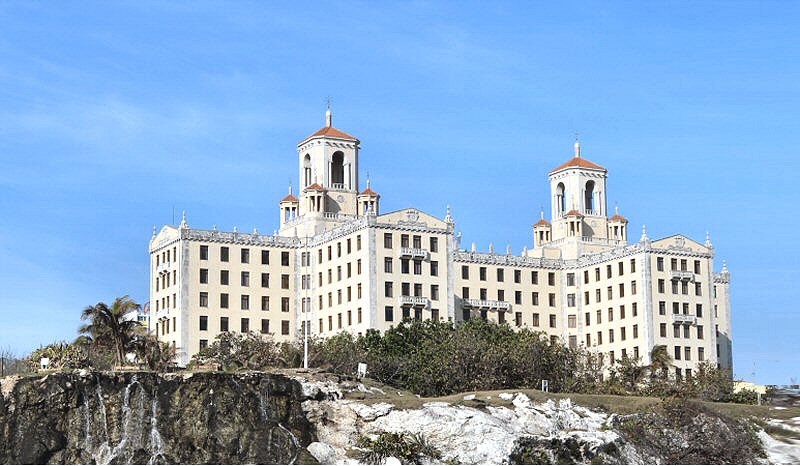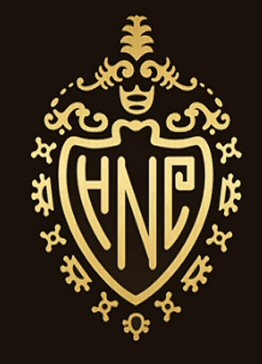

The Hotel
Nacional de Cuba is the only hotel in Cuba that is registered as
the National Monument. Furthermore, it received UNESCO’s Memory
of the World Award in 2010. The prestigious hotel is constructed
on the ocean front of the Loma Tanganana (Hill of Tanganana)
that has an important role in the history of Havana.
Until the 17th century, the colonial government prohibited
to cut the firetree in this region and to build roads that would
open to the beach, as general precautions of protecting the Old
City from the constant attacks of the corsairs. The ceaseless
fear of the rulers from the attacks of the corsairs and the
enemy navies, led the colonial government to build several
castles and towers around the Old City in the first half of the
17th century, the last being the Torreón de San Lázaro that was
built in 1665. However, considering the fact that this small
tower was just a lookout tower, more than a fortification that
would take part actively in defending the seashore, the colonial
authorities decided to position a battery between the two
towers, the Torreón de San Lázaro and the Torreón de Chorrera.
The impending war against the British accelerated of putting
into practice of the project and a battery, consisting of an
artillery of 20 pieces and an artillery practicing school, was
deployed on the rocky massif where the gardens of Hotel Nacional
de Cuba
lies today. The battery was completed after a construction
process of three years in 1799 and it was named Batería de Santa
Clara after Juan Procopio Bassecourt, the Governor of Cuba and
the Count of Santa Clara. The place was chosen especially,
because from this point the regidor Don Luis Aguiar had given to
the British Navy hard time during the British siege of Havana in
1762.
The battery
was 80 meters far from the sea, and it had a parapet of about
200 meters long. Due to its high position it was dominating the
whole cove of San Lázaro. In 1890, the parapet was reconstructed,
using reinforcing bars and Portland concrete. It was one of the
first occasions in that the Portland concrete was used in the
island.
When the US
Congress prohibited the production, sale and consumption of
alcohol in 1920, a campaign was held, particularly by the
Bacardí rum Company, promoting Cuba as a tropical island ideal
for the people that want to escape from the restriction of
alcohol consumption in USA. The efficient tactics of this
strategy, such as the mailing of the postcards that illustrate
the allure of the Havana nights with the Bacardí rum cocktails,
and the encouragement of a major airline company the US
customers by phrases like “to fly to Cuba and to bath in Bacardí
rum”, turned out satisfactory and American tourists flocked to
the bars of Havana. The influx of the tourists, particularly the
US citizens, increased the demand to new hotels. On the other
hand, for the big chiefs of the American Mafia, Cuba was an
ideal country where they would be in safe and earn a lot of
money by gambling, prostitution and drug traffic. This
atmosphere led to demolish the Batería de Santa Clara in the
first quarter of the 20th century to build a luxurious hotel on
its land. The American architecture company Mc Kim, Mead & White
and the American engineering company Purdy Henderson completed
the construction of the new hotel in 14 months, so that the
Hotel Nacional de Cuba was put into service with a ball on the night of
December 30 in 1930.
The Hotel
Nacional de Cuba quickly became the favorite place of some notable
personalities, like Edward VIII, Ernest Hemingway, Nelson
Rockefeller, Baron Thyssen, Alexander Fleming, Rocky Marciano,
Micky Mantle, Marlon Brando, Ava Gardner, Errol Flyn, Johny
Weissmüller (Tarzan), Tyrone Power, Rita Hayworth, Fred Astaire,
Pedro Vargas, Agustin Lara, Nat King Cole, Frank Sinatra, among
others. However, the Hotel Nacional had also other important
guests like Lucky Luciano, the leader of Mafia, and Meyer
Lansky, the accountant of Mafia. The Mafia started to control
the bookmaking in the hotel after 1933. The Havana meeting of
the Mafia, the first large-scale meeting of the US and the
Sicilian Mafia after the Chicago meeting in 1932, was held in
the former casino of the Hotel Nacional in 1946. The so-called
Havana Conference was portrayed in the movie The Godfather II;
however, the scenes were filmed in Dominican Republic.
Following the revolution, gambling was declared as illegal and the hotel’s casino was closed. The hotel’s name was also converted from English to Spanish, and the hotel continued to accept world-wide known guests, like Compay Segundo, Winston Churchill, Nat King Cole, Gary Cooper, Josephine Baker, Ava Gardner, John Wayne, Yuri Gagarin, Jean Paul Sartre, Gabriel García Marquez, Fred Astaire, Simone de Beauvoir, Michel Legrand, Francis Ford Coppola, Pierre Cardin, Jack Nicholson, José Raúl Capablanca, Daniela Miterrand, Naomi Campbell, Steven Spielberg, Leonardo DiCaprio, Marlon Brando, Michael Keaton, Paris Hilton, Vladimir Putin, Yuri Gagarin, Bolivian President Evo Morales, Erroll Flynn, Agustín Lara, former Iranian President Mahmoud Ahmadinejad, Chinese President Xi Jinping, Jimmy Carter, and ofcourse in the 1960s Fidel Castro and Che Guevara.
The Hotel Nacional de Cuba is located
on the 21th street, bordered by the Malecón and the initial
section of the 23rd Street, called La Rampa.

